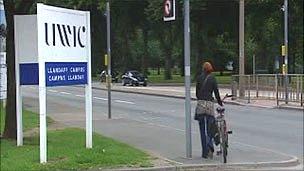Q&A on university turmoil in Wales
- Published
Higher education in Wales is in turmoil. Universities have been told by the education minister that they must change or disappear, and, separately, the BBC has revealed a scam in which overseas students are helped to cheat their way to University of Wales-validated degrees. So what is the sector's likely future?

Swansea Metropolitan University is merging with Trinity Saint David and the University of Wales
What is happening to Welsh universities?
At the end of last year Education Minister Leighton Andrews told Welsh universities to "adapt or die". He said there will be significantly fewer universities in Wales by 2013, indicating smaller institutions are to be forced into mergers in order to deliver larger and stronger ones. But he insisted there would not be a reduction in the number of places for students.
He said: "Wales has been dogged for years by many institutions which are too small to cut a mark internationally, too small to withstand and respond to the growing pressure of international competition, and in danger of wasting resources competing with neighbours rather than looking out from Wales to win reputation and research income."
He warned that universities' future funding, including being allowed to charge higher tuition fees, would depend on a willingness to "progress swiftly to merger and reconfiguration".
How does the Welsh government intend to cut the number of universities?
In July, the Higher Education Funding Council Wales (Hefcw), the body funding higher education, created a blueprint for the way forward for the Welsh government.
In a report, it said it would cut the number of universities in Wales from 11 to six. It said distribution should reflect regional needs with no more than two institutions in each region.
To do this, it insisted mergers were needed between smaller universities across Wales and urged:
A merger between the University of Glamorgan, the University of Wales Institute Cardiff (Uwic), and University of Wales, Newport, to create a "metropolitan" university, comparable to those in similarly-sized cities and regions around the UK.
Trinity Saint David and Swansea Metropolitan University to merge as planned with the University of Wales. The three announced they would work together over the coming months to create a unified institution under the charter of the University of Wales, with the aim of a formal merger by August 2012.
A strategic alliance between Aberystwyth and Bangor universities should be deepened, with a long-term plan for merger, working with Glyndwr University in Wrexham.
Cardiff and Swansea Universities to continue to exist as separate institutions, although with more collaboration between them.
The education minister said he was inclined to accept the "broad thrust" of the recommendations, with more consultation before any final decision. The deadline for submissions from affected universities passed on Wednesday.
How did the proposals go down with the universities?

Uwic does not want to merge with the University of Wales, Newport and the University of Glamorgan
University leaders in Wales signalled they would co-operate with the proposals.
Higher Education Wales (HEW), which represents universities, agreed they need them to be "fewer but stronger," but any mergers should be for the particular university governing bodies to decide.
Since then it would appear that many universities have been courting each other to establish possible mergers and collaborations. Others have insisted they want to remain independent.
Uwic announced on Wednesday that it was not interested in merging to form a super-university for south east Wales. But University of Wales, Newport and the University of Glamorgan, still support the plan for a new metropolitan university.
Glyndwr University in Wrexham is also keen to be independent and has announced it will leave the alliance of institutions making up the University of Wales. The decision followed Hefcw's proposal for it to team up with other further education colleges under the leadership of Aberystwyth and Bangor universities. The changes mean Glyndwr will fully award its own degrees rather than those from the University of Wales.
Trinity Saint David and Swansea Metropolitan University are pressing ahead with their panned merger with the University of Wales.
What of the controversy surrounding the University of Wales?
This is nothing to do with the merger plan, but adds to the upheaval within higher education.
BBC Wales has exposed a scam in which overseas students are helped to cheat their way to University of Wales-validated degrees and visas was being investigated by the UK Border Agency.
It was revealed that students were being sold diplomas exempting them from work for MBAs, which then entitles them to apply for a UK visa. Two staff at Rayat London College have been suspended and the registrar has resigned.
Two days before the BBC's latest revelations, the University of Wales announced that it would no longer validate degree courses at both its affiliated member institutions in Wales - Glyndwr, Uwic and University of Wales, Newport - and approved colleges abroad. It said the University of Wales would now award degrees only for courses it designs and fully controls.
When will a final decision on the new universities be reached?
The consultation period for Hefcw's proposals for the merged universities ended on Wednesday. The Welsh government has so far received nearly 150 written representations from stakeholders and the public on Hefcw's recommendations.
A spokesperson said: "We will be considering the representations made to us over the next few weeks."
As a last resort, the minister has the power to forcibly merge universities under the Education Reform Act 1988.
- Published5 October 2011
- Published5 October 2011
- Published29 September 2011
- Published24 July 2010
- Published13 July 2011
- Published4 July 2011
- Published22 December 2010
- Published3 December 2010